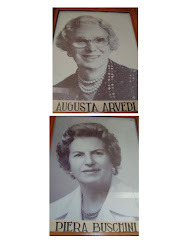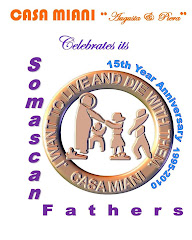.jpg)
.jpg)
Cool pose after 2 days of draining session
.jpg) Casa Miani was one of the NGOs who was invited to represent the province to the 2nd Regional Children’s Congress held at RELC in Rawis, Legazpi City on Oct 15-18, 2008. It was sponsored by the DSWD F.O.-V in partnership with the CRC Council for the Welfare of Children. There were 70+ children coming from the different parts of the Bicol Region. The province of Sorsogon sent 6 participants namely Nicole of Irosin, Kristel & Rachel of Casiguran, Love & Angel Rose of Castilla and 2 are from NGOs Rosa Bigtas of Jardin de Maria and Charles Philip Orgaya from Casa Miani.
Casa Miani was one of the NGOs who was invited to represent the province to the 2nd Regional Children’s Congress held at RELC in Rawis, Legazpi City on Oct 15-18, 2008. It was sponsored by the DSWD F.O.-V in partnership with the CRC Council for the Welfare of Children. There were 70+ children coming from the different parts of the Bicol Region. The province of Sorsogon sent 6 participants namely Nicole of Irosin, Kristel & Rachel of Casiguran, Love & Angel Rose of Castilla and 2 are from NGOs Rosa Bigtas of Jardin de Maria and Charles Philip Orgaya from Casa Miani.There were several topics discussing the importance of the role and involvement of the children in our society and above all the main reason of this gathering is to strengthen the sector of children being the future generation equipped and empowered with skills and characteristics.
The speakers are Mrs. Nilda Antivola, Mrs. Beth Molaer, A representative from DOTC The topics which were highlighted and discussed are the following
• Orientation on LCPC Local Council for the Welfare of Children
• DILG’s Commitment on Child 21 pursuant to MC 2002-126 dated August 8, 2002
• Child 21
• CICL R.A. 9344 ( Children in Conflict With the Law)
. Climate Change
A child refers to a person below 18 years of age or over said age and who upon evaluation of qualified Physician, Psychologist or Psychiatrist is found to be incapable of taking care of himself fully because of a physical or mental disability.
United Nations Convention on the Rights of the Child (UNCRC)
- is an international treaty that recognizes the human rights of the children
It stresses on the four (4) Fundamental Rights of Children:
• Survival rights include the inherent right to life, the right to name and nationality, the right to identity and those dealing with parental and governmental duties and obligations, adequate and decent standard of living access to basic health care and services, social security and rehabilitation.
• Development rights refer to access to educational opportunities, relevant information, play, leisure, cultural activities, and rights to freedom of thought, conscience and religion.
• Participation rights pertain to the rights of freedom to expression and to have one’s views taken into account, involvement in decision making and consultative process, freedom of association and assembly.
• Protection rights cover those rights which guard children against allforms of abuses, exploitation and discrimination, and in areas where a child is considered to be in extremely difficult circumstances.
The Philippine National Strategic Framework for Plan Development for Children, otherwise known as ”Child 21”, is a strategic framework for planning programs and intervention that promote and safeguard the rights of Filipino children. As a strategic framework it will assist different stakeholders in their respective planning and program efforts and serve as a common frame of reference to the different stakeholders to maximize the impact of intervention for the child.
• It is a long term framework for a period of 25 years and covers a long-term vision for the Filipino children that describe the kind of society we want them to have. It compliments existing plans of government such as the Medium Term Philippine Development Plan (MTPDP) which covers up to year 2004.
• It is the legacy that we will leave for the Filipino Children of the 21st century to prepare them to face the challenges of the new millennium.
What is our shared vision for Filipino Child?
Based on child’s rights throughout the LIFE STAGES OF DEV’T, by year 2025, we envision the Filipino child to be:
Born healthy & well, with inherent right to life endowed with human dignity
Happy, loved & nurtured by a strong, stable & God-loving family
Living in peaceful, progressive, gender-fair & CF society
Growing safe in a healthy environment and ecology
Free and protected by a responsive & enabling gov’t
Reaching her/his full potential with the right opportunities and accessible resources
Have Filipino values steeped in her/his indigenous cultural heritage
Assertive of her/his rights as well as those of others
Actively participating in decision-making and governance, in harmony and in solidarity with others, in sustaining the Filipino nation.
CHILD’s RIGHTS IN EVERY LIFE STAGE
• Pre-Natal Period
To be carried to term with proper nutrition & have normal fetal dev’t the womb of a healthy and properly nourished mother
Infancy (0-2 yrs.)
- to be registered at birth
- To be exclusively breastfed from birth to 6 mos.
- To receive complete and timely immunization from common
childhood diseases
Early Childhood (3-5 yrs)
- Experience early childhood care & stimulation for development
- To avail of free micronutrient supplements
Childhood (6-12 yrs)
- Free & compulsory elem. education
- Avail of open & flexible learning systems
- participate in quality and relevant education appropriate to the child’s development stage & capacity
Adolescence (13-17 yrs)
- To receive free secondary educ.
- Further avail of open & flexible learning systems
- Further participate in quality, relevant & appropriate education.
- - Participate in devt’l process



.jpg)
.jpg)
.jpg)
.jpg)
.jpg)
.jpg)
.jpg)
.jpg)
.jpg)
.jpg)
.jpg)
.jpg)
.jpg)















0 Comments:
Post a Comment